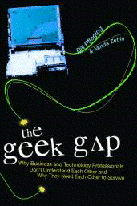Product recall does not illustrate Geek Gap??
Every semester, Bill and I do a presentation on the Geek Gap to a management class at Rensselaer Polytechnic Institute (RPI) in Troy, N.Y.
These are the technology leaders of tomorrow (in case you're not familiar with it, RPI is a top school for geeks. Uber-geek Ethan Zuckerman, who wrote an introduction for The Geek Gap is just one of its many prominent alumni.)
Perhaps because they are young, they are comfortable with technology, and have not been too exposed to the world of business yet, some of the students have doubts about whether there really is such a thing as a gap between business and IT people. Not that they've ever said so to our faces, but we've heard back from their instructors that this skepticism sometimes comes up in post-class discussions.
That's what happened, so we were told, after our most recent visit to the leadership class. But this time around it was kind of surprising.
Here's why: Many of the students also work as interns in large and small companies as part of their education, and during class we talk to them about their experiences. That's often a great way to illustrate the Geek Gap, and this time was better than most.
The whole class listened as one of their classmates described working at a company that had recently had a product recall. One of the components of the product, he explained, was not of dependable enough quality to be used in the product. The student explained that people in the tech department where he worked had demonstrated through statistical analysis that it wouldn't be good enough. The company went ahead and used it anyway.
As the suit representative of our duo, I responded: "Was the component lower in cost than the other alternatives?"
The student looked at me blankly. He had no idea. It clearly had not, until that moment, occurred to him that this might be the explanation.
"Obviously, when a company is forced to recall a product, that has to count as a failure," I continued. "Nobody wants that to happen. But you don't want a product that's so expensive to produce that the company loses money every time someone buys one. That would be bad too, wouldn't it? So maybe they were stuck with impossible choices, and they decided to give the weak component a try. And for whatever reason, they wouldn't, couldn't, or didn't listen to the technology people who knew it would never work."
I thought I'd gotten my point across, till I heard about their discussion later: Did the Geek Gap really exist? That description of the product recall was the best illustration of the Geek Gap I'd come across in a while. Why didn't they get it?
I guess this is why Bill dubbed the Geek Gap "the elephant in the corner"--so big that people actually can't see it.
Or, as George Orwell put it, "To see what is in front of one's nose needs a constant struggle."
These are the technology leaders of tomorrow (in case you're not familiar with it, RPI is a top school for geeks. Uber-geek Ethan Zuckerman, who wrote an introduction for The Geek Gap is just one of its many prominent alumni.)
Perhaps because they are young, they are comfortable with technology, and have not been too exposed to the world of business yet, some of the students have doubts about whether there really is such a thing as a gap between business and IT people. Not that they've ever said so to our faces, but we've heard back from their instructors that this skepticism sometimes comes up in post-class discussions.
That's what happened, so we were told, after our most recent visit to the leadership class. But this time around it was kind of surprising.
Here's why: Many of the students also work as interns in large and small companies as part of their education, and during class we talk to them about their experiences. That's often a great way to illustrate the Geek Gap, and this time was better than most.
The whole class listened as one of their classmates described working at a company that had recently had a product recall. One of the components of the product, he explained, was not of dependable enough quality to be used in the product. The student explained that people in the tech department where he worked had demonstrated through statistical analysis that it wouldn't be good enough. The company went ahead and used it anyway.
As the suit representative of our duo, I responded: "Was the component lower in cost than the other alternatives?"
The student looked at me blankly. He had no idea. It clearly had not, until that moment, occurred to him that this might be the explanation.
"Obviously, when a company is forced to recall a product, that has to count as a failure," I continued. "Nobody wants that to happen. But you don't want a product that's so expensive to produce that the company loses money every time someone buys one. That would be bad too, wouldn't it? So maybe they were stuck with impossible choices, and they decided to give the weak component a try. And for whatever reason, they wouldn't, couldn't, or didn't listen to the technology people who knew it would never work."
I thought I'd gotten my point across, till I heard about their discussion later: Did the Geek Gap really exist? That description of the product recall was the best illustration of the Geek Gap I'd come across in a while. Why didn't they get it?
I guess this is why Bill dubbed the Geek Gap "the elephant in the corner"--so big that people actually can't see it.
Or, as George Orwell put it, "To see what is in front of one's nose needs a constant struggle."



